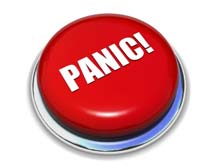Red Alert!
U.S. Says a “Terrorist Attack is Imminent”
… Anticipated any Day, Week, Month This Year!
by www.SixWise.com
Senior U.S. intelligence officials told Congress in February 2010 that a terrorist attack by Al-Qaeda on the United States is likely within the next three to six months.
|

Senior U.S. intelligence officials say a terrorist attack is likely on U.S. soil within six months or less.
|
"My greatest concern and what keeps me awake at night is that al-Qaeda and its terrorist allies and affiliates could very well attack the United States in our homeland," CIA Director Leon Panetta told the Senate Select Committee on Intelligence.
Intelligence officials said that complex, multiple-team attacks have become increasingly difficult for Al-Qaeda, forcing them to switch tactics to simpler attack methods.
Counterterrorism expert Juval Aviv expressed similar sentiments in an interview with FOX News. When asked whether he believes another terrorist attack is likely on American soil, he said:
“I predict, based primarily on information that is floating in Europe and the Middle East, that an event is imminent and around the corner here in the United States. It could happen as soon as tomorrow, or it could happen in the next few months. Ninety days at the most.”
Why Hasn’t the U.S. Government Issued a Red Alert?
Given these latest reports from top intelligence officials, it seems unusual that the Department of Homeland Security has not issued a Red Alert.
As of February 12, 2010, the United States government’s national threat level was Yellow, or Elevated, while the threat level for domestic and international flights was Orange, or High. Neither has been raised to the most serious threat level, the Red Alert.
In the UK, meanwhile, Home Secretary Alan Johnson raised the threat of a terrorist attack from substantial to severe -- the Red Alert.
Still, would a raised national threat level mean anything to you? Have you made any changes to your life since the U.S. level has been elevated? As the Daily Mail’s Peter McKay writes, perhaps the red alert is not so useful after all:
“What does he [Alan Johnson] expect us to do? Remain alert, is his suggestion. I don't see how that would help.
Decide not to travel? That would achieve one of the terrorist aims: economic chaos.
Stay away from work? The same. Report any suspicious activity by strangers? Frivolous, time-wasting calls would swamp any useful ones.
No sensible purpose is served by setting up such an alert system other than to give the Government cover.”
Likewise, in the United States, the Department of Homeland Security (DHS) advises “all Americans should continue to be vigilant, take notice of their surroundings, and report suspicious items or activities to local authorities immediately.”
While this is commonsense advice, would it really help you in the event of a terrorist attack?
Not at all. Fortunately, DHS also advises, “Everyone should establish an emergency preparedness kit and emergency plan for themselves and their family, and stay informed about what to do during an emergency.”
What Should You do to Avoid Being Caught in a Terrorist Attack?
We have all already been affected by the 9-11 attacks. The economy crashed, many lost loved ones or knew loved ones or friends who were in some way involved or affected by 9-11. So we have all been impacted by terrorism in the United States in one way or another.
How badly did 9-11 impact you -- emotionally and/or financially -- AT THAT TIME?
While it’s surely stamped in all our memories, it probably has not changed most of our lives to the level that we are now thinking about being prepared!
Our memories have a way of protecting us from bad experiences of the past. In time, those memories fade and become less poignant, less damaging. This “survival memory” is what allows us to move on with our lives. However, this survival memory also makes us forget the importance of being prepared should a 9-11 style attack occur once again.
The question is, how can you be prepared for whatever may come?
For starters, Juval Aviv told FOX News he believes the next attack will be coming on mass transportation, i.e. subways, trains, buses etc. He shares some excellent tips with FOX News that we suggest you take note of now:
“Since mass transportation is the next attack, when you travel to work have with you, a bottle of water, a small towel and a flashlight. What happened in London is exactly a point to look at. Those people who were close to the bombs died, then others were injured or died from inhaling the toxic fumes or getting trampled.
The reason you take a bottle of water and a towel is that if you wet the towel and put it over your face, you can protect yourself against the fumes and get yourself out of there.
Don't be bashful. If your gut feeling tells you when you walk onto a bus there is something unusual or suspicious, get out and walk away. You may do it 10 times for no reason, but there will be one time that saves your life. Let your sixth sense direct you.
Try to break your routine. If you travel during rush hour every day, try to get up a little earlier and drive to work or take the train when it’s still not full. Don’t find yourself every day in the midst of rush hour. Terrorists are not going to waste a bomb on a half-empty train.”
Preparing an Emergency Kit for Your Home
|

When a terrorist attack occurs, you’re likely to be stricken by chaos and panic. That’s why it’s so important to be prepared, practiced and ready ahead of time.
|
Aside from staying vigilant about your surroundings -- and again following your intuition to guide you -- every family should keep the basics necessary for at least three days of survival (for each family member and pet) on hand at all times. The U.S. Department of Homeland Security recommends including the following items in your kit:
-
Other family necessities: This could include prescription medications, infant formula, diapers, important family documents, etc.
Create a Family Disaster Plan
Getting prepared well in advance for a possible emergency is extremely important, as once a terrorist attack strikes you may be swept up in chaos and panic. Knowing you have a plan in place, and having practiced that plan a few times before, can literally save your life.
It only takes a small investment of your time to take this potentially lifesaving step. The Federal Emergency Management Agency (FEMA), along with the American Red Cross, suggest following these four steps to best prepare your family for disaster.
1. Find out what the threats are.
Depending on where you live, certain types of disasters are more likely to happen. Your local emergency management office, civil defense office or American Red Cross chapter can tell you what threats exist in your region, and give you information to prepare for each.
Once you know the threats, make sure you're familiar with your town's warning signals. A tornado siren may sound different from a terrorist attack warning, for instance.
Also be sure to ask about disaster plans at your workplace and your children's school or day care. Each should have a predetermined plan in place.
2. Create your family disaster plan.
Have a family meeting, including the children, to discuss the purpose of the disaster plan, and the most likely reasons why you may have to use it. Then:
- Pick two meeting places. One should be right outside your home (near a familiar tree, for instance) in case of a fire, etc., and one should be outside of your neighborhood, in case it's not safe to return home. Make sure everyone knows the address and phone number of this location.
- Choose an out-of-state "family contact." In an emergency, it may be easier to make a long distance call than one to the affected area. Each family member should know the name and phone number of the out-of-state contact, and should call them with their location during a disaster.
- Discuss what to do in an evacuation, including how to take care of your pets.
And remember, if you go over the plan once and never speak of it again, chances are you'll forget it. Just like schools conduct periodic fire and disaster drills, your family should too. Every six months or so, go over the important information (contact names, phone numbers, meeting places, etc.) with your spouse and kids, and conduct fire and emergency evacuation drills in your home.
Also be sure to replenish emergency supplies like water and food (they'll only last so long before going bad), test and recharge your fire extinguishers and test (and change the batteries in) your smoke detectors.
Hopefully you will never need to execute your family disaster plan or use any of the supplies in your emergency kit … but just in case a terrorist attack does occur, being prepared ahead of time could very well save your life.
Recommended Reading
Physicians Create List of Who Will Live and Who Will Die in Pandemic / Disaster Scenario
The Six Most Feared but Least Likely Causes of Death
Sources
Daily Mail January 24, 2010
FOXNews.com
Examiner.com February 4, 2010
U.S. Department of Homeland Security